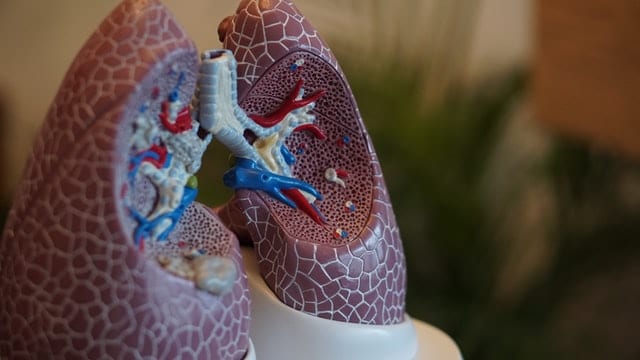Emphysema is part of the group of Chronic Obstructive Pulmonary Diseases (COPD). This group of diseases affects over 251 million people in the world. Emphysema and COPD are strictly related to the exposure to cigarettes, therefore are preventable.
What Is Emphysema?
The lungs are organs whose main function is to manage gas exchange, a process called respiration. The lungs receive the oxygen coming from the air we breathe and makes sure that it reaches the red cells of blood. The lungs also help the body get rid of carbon dioxide and waste gas from our metabolism when we breathe out.
Emphysema involves the damage of the air sacs located in the lungs called alveoli. These are thin wall air pockets located at the end of the bronchial tubes deep inside the lungs; the alveoli are the structures responsible for the gas exchange during respiration. As we breath the alveoli stretches, drawing oxygen in and transporting it to the blood. When we exhale the alveoli shrinks to force the carbon dioxide out of the body.
In patients with emphysema, the tissue of the alveoli and the lungs are destroyed. The alveoli and bronchial tubes collapse making the air trapped inside the lungs. These changes affect the gas exchange during respiration decreasing the levels of oxygen in the blood.
Emphysema is part of the group of diseases called COPD. The most common conditions of COPD are chronic bronchitis and emphysema.
4 Causes Of Emphysema
- Smoking
Smoking is the leading cause of emphysema. 80-90% of all patients with emphysema are smokers. In general, 10 to 20% of all smokers will develop COPD. The risk is related with the amount of cigarettes per day and the years of exposure. It is important to state that second hand smoking confers the same risk as smoking itself. Emphysema is a preventable disease, quitting smoking and avoiding second hand exposure is key to avoid this condition.
- Irritating dust and fumes
Chemical fumes, vapors, dust, gases, and other chemical substances can cause emphysema. Wearing appropriate personal protective equipment during working hours is essential to prevent the disease
- Genetics
The case for a genetic cause of emphysema is very rare, but there is an inherited form of the disease called alpha 1-antitrypsin (ATT) or early onset emphysema
- Air pollution
This includes burning wood, smoke from cooking, chemical fumes, and second hand tobacco smoke. People in rural areas are especially at risk of emphysema. According to the World Health Organization (WHO) 90% of the COPD related deaths occur in rural areas
Emphysema Symptoms
Emphysema is a disease that develops slowly over time; most people will not notice any changes until the disease reaches its advanced stages.
Symptoms of emphysema include shortness of breath. Initially, the patient will start avoiding activities that can cause shortness of breath, such as exercising, but eventually emphysema will cause shortness of breath during everyday activities like walking and standing up; until it reaches a point where the patient will have difficulty breathing while at rest.
It is important to visit the doctor when you feel unexplained shortness of breath for several weeks or months, especially if it is interfering with daily activities. Some people mistake the shortness of breath for getting older or being out of shape; however, you should always seek help if you experience these symptoms just to be on the safe side
Is Emphysema A Serious Disease?
Emphysema is a chronic disease, which affects the levels of oxygen in the system; therefore, it requires medical treatment to stop the progression when possible and for treatment of the symptoms. Patients with emphysema can have complications that can be life threatening such as:
- Pneumothorax
This refers to collapsing of the lungs. This can happen to only one lung or compromise them both. This is a medical emergency since the function of the lungs is completely compromised
- Bullae
These are big pockets that occupy the lungs space compromising respiration. Bullae can increase the risk of pneumothorax as well
- Cor Pulmonale
Because emphysema is an obstructive condition, it increases the pressure of the arteries and the heart chambers and over time, causes heart failure. This condition is called cor pulmonale.
Can People Heal From Emphysema?
Emphysema has no cure. Once the disease is developed the only option is to undergo specific treatment to prevent complication and improve the quality of life of the patient. The treatments include the use of inhalers to help clear the airways and improve breathing. Some patients will need oxygen to sleep and for their regular activities during the day. In some cases lung transplant is considered as an option to treat emphysema, but this happens only when the lung tissue is severely damaged and a transplant is the only option to keep the patient alive.
Life Expectancy
The life expectancy will depend on the stage of the disease. The stages are determined by two main methods: the GOLD emphysema staging system and the BODE Index. These take into consideration the symptoms, findings on Computerized Tomography of the lungs, and the results of a test called spirometry (a device used to check lung function). The scales allow the doctors to determine the best treatment options and life expectancy.
For most diseases, life expectancy is expressed as a 5-year survival rate. This means the percentage of patients that will be alive after five years from the diagnosis of the disease. In the case of emphysema, the 5-years survival rate ranges from 40% to 70%. Meaning that 40 to 70 people out of every 100 will be alive by year five of the diagnosis. This number will change depending on the stage of the disease and whether or not the patient is exposed to the risk factors such as smoking and air pollution.








